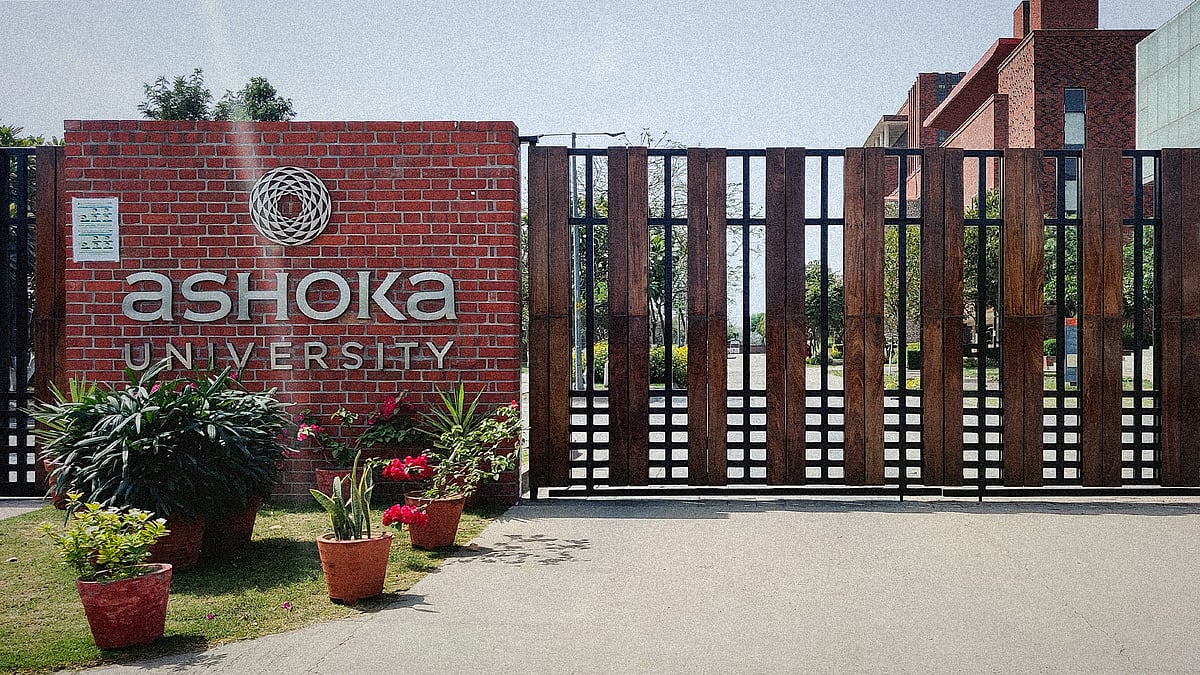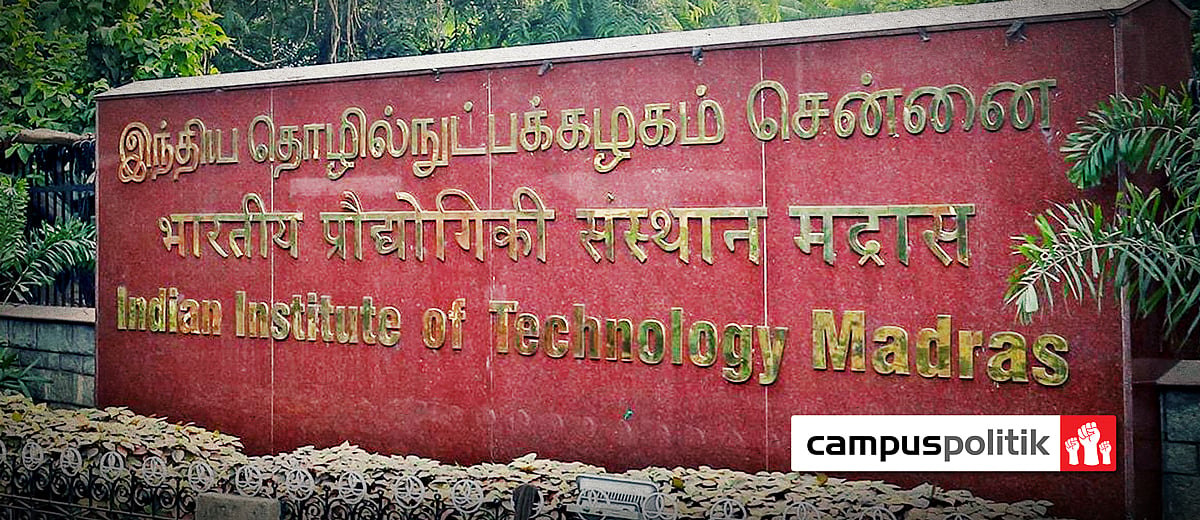Shrinking academic freedom, faculty’s existential crisis: Ashoka University struggles for its ‘liberal ethos’
A research paper on India’s ‘democratic backsliding’ was censored by the university even before being peer reviewed.
A demolition drive is going on in Sonipat. The red bricked walls of Ashoka University— which prides itself as India’s premier liberal arts institution— are being foregone for a metaphorical saffron.
Only this time, there’s no rumble of the bulldozer or the collapse of buildings. Rather, there is the razing of academic freedom, critical thought and scholarships unimpeded by political leanings – the very principles the university claims to espouse.
The point of departure was a research paper pointing to a purported democratic slump in the country.
“Democratic backsliding is a growing concern globally…The results present a worrying development for the future of democracy,” read the abstract of the paper titled Democratic Backsliding in the World’s Largest Democracy by Sabyasachi Das, now former assistant professor of Economics at Ashoka University.
The study claimed to present evidence “consistent with electoral manipulation in closely contested constituencies”, indicating that the BJP manipulated votes at the “stages of voter registration, polling and counting” in the 2019 Lok Sabha elections. It argued that the manipulation took the form of “targeted electoral discrimination against Muslims” by deletion of their names from voter lists and “suppression of their votes”.
The paper, however, said that failure of the McCrary test— a standard check for manipulation — “does not necessarily imply electoral fraud” and even without the alleged “disproportionate wins”, the general election’s outcome “likely would not have changed”.
The claims made in the research paper split the political class and the academics. Ashoka University swiftly distanced itself from the research’s “findings”. And what should have been subjected to a rigorous process of academic and peer review was censored even before it reached that stage.
Meanwhile, a section of Elon Musk’s revamped town square, X – formerly known as Twitter – rushed to conclude that the paper was an “act of sedition”. Some even went to the extremes of likening it to the January 2021 riots at the US Capitol after former US president Donald Trump alleged a “stolen 2020 Presidential election”.
Subsequently, the assistant professor quit. Ashoka University’s vice chancellor Somak Raychaudhury confirmed on August 14 that his resignation had been accepted.
A second professor, Pulapre Balakrishnan, reportedly resigned soon after while the university’s economics department issued a public statement demanding that professor Das be “unconditionally reinstated”.
The English and creative writing department also wrote to the university’s governing body: “Unless these questions regarding basic academic freedoms are resolved before the Monsoon 2023 semester, faculty members of the department will find themselves unable to carry forward their teaching obligations…”
Later, the department of political science also joined in followed by the department of sociology and anthropology.
Other academics panned Ashoka University.
Not new to controversy
This isn’t the first time a scholarly voice of democratic dissent has found itself in the cross-hairs of controversy at Ashoka University.
In 2021, the university refused to stand by its faculty members critical of the incumbent BJP government, leading to high-profile resignations.
Former vice chancellor and professor Pratap Bhanu Mehta and former chief economic advisor and professor Arvind Subramanian quit the university over two years ago over purported decline in free and critical discourse on campus.
Subramanian said that “even Ashoka – with its private status and backing by private capital – can no longer provide a space for academic expression and freedom is ominously disturbing”.
For all its claims to maintain an “Ashokan ethos”, the governing body, comprising chancellor Rudrangshu Mukherjee, vice chancellor Somak Raychaudhury, Ashish Dhawan and Pramath Raj Sinha, among others, has failed to uphold the ideals that supposedly make the university “Ivy League, Indian-style”. In a Financial Times op-ed, Dhawan had claimed that Ashoka University was “about building a better democracy”, which needed people “who are independent thinkers…willing to question power”.
In light of the recent developments, these words are void of meaning. If only pledge to principles were not simply lip service, or a PR sermon. That’s one of the many things we wish for.
Where is academic freedom?
The state of affairs at Ashoka University is not unusual, and does not exist in a vacuum. Instead, it’s the writing on the wall – testament to the current government’s authoritarian tendencies, and a departure from the founding principle of the liberal institution that Ashoka University had promised to be.
Of course, the faculty does not have a “divine right”. But arguments alleging lack of imagination for this debate around academic freedom fall short of any real substance, precisely because they do not provide for the due diligence of the scholarly process. Thus, a broader issue is at stake here – the gradual erasure of civil liberties and shrinking civic spaces.
In the 2022 Free to Think report, Scholars at Risk, an international network of higher education institutions aiming to defend academic freedom, noted that “already low scores and in some cases significant drops were seen in many of the countries featured in Free to Think 2022, including India, Nicaragua, Russia, Turkey, and the United States.”
The report cited India as one of the countries “where there have been authoritarian crackdowns on outspoken scholars”.
To state a few: Ravi Kant Chandan, a Dalit professor of Hindi at Lucknow University, was allegedly harassed, threatened and assaulted at the hands of ABVP members in May 2022.
In the same month, Sharda University had allegedly suspended assistant professor of political science Waqas Farooq Kuttay for an exam question which reportedly asked: “Do you find any similarities between Fascism/Nazism and Hindu right wing (Hindutva)? Elaborate with arguments.”
Another professor at Delhi University’s Hindu College, Ratan Lal, was arrested for writing an “objectionable” Facebook post about a Shivling that was supposedly found at Varanasi’s Gyanvyapi mosque.
In 2021, JNU’s administration ordered the cancellation of the webinar, “Gender resistance and fresh challenges in post-2019 Kashmir,” which aimed to assess the resistance and dissent in Kashmir in wake of the abrogation of Article 370.
The mention of Kashmir takes one back to 2016, when three Ashoka University employees, including assistant professor Rajendran Narayanan, reportedly had to quit their jobs over a petition condemning the Indian government’s use of force in the Valley. The university was also questioned over reportedly misrepresenting facts related to the resignations.
What can be done?
So, what awaits students? One can only imagine given the predicament of the university’s faculty. In its open letter to the governing body, the university’s economics faculty said the recent events pose an “existential threat” to the department.
The letter said that for the smooth onset of the monsoon 2023 semester, the university must put in place checks and balances to “prevent” the seemingly imminent “exodus of faculty”.
To ensure the “very viability of the Ashoka vision”, the university needs a firewall between its academic and administrative wings. It needs to reevaluate its stance on academic freedom, lest it fall prey to an almost McCarthyist crackdown on civil liberties that begins with the caging of free-thinking minds.
For this, the university does not need to look very far. Its students and faculty are willing to do the dirty work.
For institutional precedent too, the university must turn its gaze not too far in the west – to a Gujarat model worth emulating. In a rare assertion of academic freedom in March 2021, Errol D’Souza, the director of IIM Ahmedabad, refused the education ministry’s directive to put on hold a student’s PhD dissertation that reportedly said the BJP is “a pro-Hindu upper caste party”.
Such a position may be a rarity in Indian academia now, but if Ashoka University has to cement its reputation as a world-class institution, it must stand out. If this worrying demolition drive of ideas continues, the gravitas of statuesque principles that Ashoka claims to inhabit and profess will only be the ideals it suppresses and persecutes. Its red bricks will be replaced with red tape, black lists and saffron walls.
To borrow from the paper that started it all, “the results present a worrying development for the future of democracy.”
The writer is an alumnus of Ashoka University.
 Why Pratap Bhanu Mehta’s resignation has upset staff and students of Ashoka University
Why Pratap Bhanu Mehta’s resignation has upset staff and students of Ashoka University Suicides in IITs: Students blame academic pressure and discrimination based on caste, religion
Suicides in IITs: Students blame academic pressure and discrimination based on caste, religion